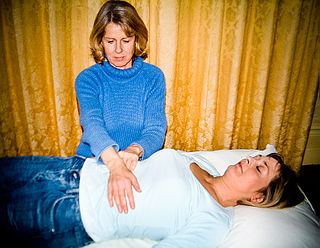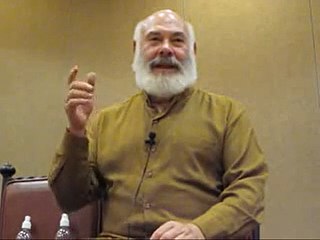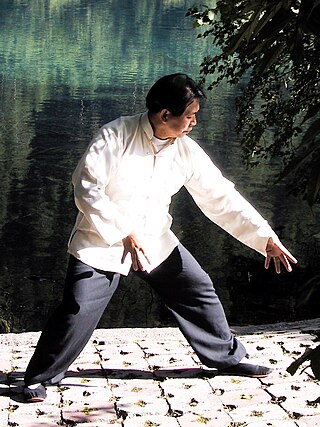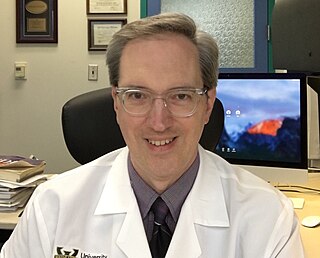Related Research Articles
Alternative medicine is any practice that aims to achieve the healing effects of medicine despite lacking biological plausibility, testability, repeatability or evidence of effectiveness. Unlike modern medicine, which employs the scientific method to test plausible therapies by way of responsible and ethical clinical trials, producing repeatable evidence of either effect or of no effect, alternative therapies reside outside of mainstream medicine and do not originate from using the scientific method, but instead rely on testimonials, anecdotes, religion, tradition, superstition, belief in supernatural "energies", pseudoscience, errors in reasoning, propaganda, fraud, or other unscientific sources. Frequently used terms for relevant practices are New Age medicine, pseudo-medicine, unorthodox medicine, holistic medicine, fringe medicine, and unconventional medicine, with little distinction from quackery.

Reiki is a pseudoscientific form of energy healing, a type of alternative medicine originating in Japan. Reiki practitioners use a technique called palm healing or hands-on healing through which, according to practitioners, a "universal energy" is transferred through the palms of the practitioner to the client, to encourage emotional or physical healing. It is based on qi ("chi"), which practitioners say is a universal life force, although there is no empirical evidence that such a life force exists.
Rolfing is a form of alternative medicine originally developed by Ida Rolf (1896–1979) as Structural Integration. Rolfing is marketed with unproven claims of various health benefits, is recognized as pseudoscience and has been characterized as quackery. It is based on Rolf's ideas about how the human body's "energy field" can benefit when aligned with the Earth's gravitational field.
The National Center for Complementary and Integrative Health (NCCIH) is a United States government agency which explores complementary and alternative medicine (CAM). It was initially created in 1991 as the Office of Alternative Medicine (OAM), and renamed the National Center for Complementary and Alternative Medicine (NCCAM) before receiving its current name in 2014. NCCIH is one of the 27 institutes and centers that make up the National Institutes of Health (NIH) within the United States Department of Health and Human Services.

The history of alternative medicine covers the history of a group of diverse medical practices that were collectively promoted as "alternative medicine" beginning in the 1970s, to the collection of individual histories of members of that group, or to the history of western medical practices that were labeled "irregular practices" by the western medical establishment. It includes the histories of complementary medicine and of integrative medicine. "Alternative medicine" is a loosely defined and very diverse set of products, practices, and theories that are perceived by its users to have the healing effects of medicine, but do not originate from evidence gathered using the scientific method, are not part of biomedicine, or are contradicted by scientific evidence or established science. "Biomedicine" is that part of medical science that applies principles of anatomy, physics, chemistry, biology, physiology, and other natural sciences to clinical practice, using scientific methods to establish the effectiveness of that practice.

Andrew Thomas Weil is an American celebrity doctor who advocates for integrative medicine.
Anthroposophic medicine is a form of alternative medicine based on pseudoscientific and occult notions. Devised in the 1920s by Rudolf Steiner (1861–1925) in conjunction with Ita Wegman (1876–1943), anthroposophical medicine draws on Steiner's spiritual philosophy, which he called anthroposophy. Practitioners employ a variety of treatment techniques based upon anthroposophic precepts, including massage, exercise, counselling, and administration of substances.

Alternative cancer treatment describes any cancer treatment or practice that is not part of the conventional standard of cancer care. These include special diets and exercises, chemicals, herbs, devices, and manual procedures. Most alternative cancer treatments do not have high-quality evidence supporting their use and many have been described as fundamentally pseudoscientific. Concerns have been raised about the safety of some purported treatments and some have been found unsafe in clinical trials. Despite this, many untested and disproven treatments are used around the world.

Energy medicine is a branch of alternative medicine based on a pseudo-scientific belief that healers can channel "healing energy" into a patient and effect positive results. The field is defined by shared beliefs and practices relating to mysticism and esotericism in the wider alternative medicine sphere rather than any sort of unified terminology, leading to terms such as energy healing or vibrational medicine being used as synonymous or alternative names. In most cases there is no empirically measurable energy involved: the term refers instead to so-called subtle energy. Practitioners may classify the practice as hands-on, hands-off, and distant where the patient and healer are in different locations. Many schools of energy healing exist using many names: for example, biofield energy healing, spiritual healing, contact healing, distant healing, therapeutic touch, Reiki or Qigong.
Nicholas James Gonzalez was a New York–based physician known for developing the Gonzalez regimen, an alternative cancer treatment. Gonzalez's treatments are based on the belief that pancreatic enzymes are the body's main defense against cancer and can be used as a cancer treatment. His methods have been generally rejected by the medical community. and he has been characterized as a quack and fraud by other doctors and health fraud watchdog groups. In 1994 Gonzalez was reprimanded and placed on two years' probation by the New York State Medical Board for "departing from accepted practice".

Qigong, is a system of coordinated body-posture and movement, breathing, and meditation said to be useful for the purposes of health, spirituality, and martial arts training. With roots in Chinese medicine, philosophy, and martial arts, qigong is traditionally viewed by the Chinese and throughout Asia as a practice to cultivate and balance the mythical life-force qi.

Hans Alfred Herbert Eugen Nieper was a controversial German alternative medicine practitioner who devised "Nieper Therapy". He claimed "Nieper Therapy" could to treat cancer, multiple sclerosis, and other serious diseases. His therapy has been discredited as ineffective and unsafe.
Richard C. Miller is an American clinical psychologist, author, yoga scholar and advocate of yoga as therapy.

David Henry Gorski is an American surgical oncologist and professor of surgery at Wayne State University School of Medicine. He specializes in breast cancer surgery at the Karmanos Cancer Institute. Gorski is an outspoken skeptic and critic of alternative medicine and the anti-vaccination movement. He writes as Orac at Respectful Insolence and as himself at Science-Based Medicine, where he is the managing editor.
Rachel Naomi Remen although trained as a pediatrician gained fame as an author and teacher of alternative medicine in the form of integrative medicine. She is a professor at the Osher Center of Integrative Medicine at the University of California, San Francisco. Together with Michael Lerner, she is a founder of the Commonweal Cancer Help Program, a cornerstone program at Commonweal. She is the founder of the Institute for the Study of Health & Illness. She has been featured on the PBS television series, Thinking Allowed.
Randolph Stone was an Austrian-American chiropractor, osteopath and naturopath who founded polarity therapy, a technique of alternative medicine. He had an interest in philosophy and religions, and encountered Ayurvedic philosophy on a trip to India. His background in chiropractic was shaped by his studies of various Eastern concepts of energy medicine, including Ayurveda, traditional Chinese medicine, yoga, and reflexology.
Avni Sali, is an Australian professor, surgeon, and academic primarily known for advocating an integrative approach to medicine, combining evidence-based complementary therapies with conventional medicine.
Alternative medicine describes any practice which aims to achieve the healing effects of medicine, but which lacks biological plausibility and is untested or untestable. Complementary medicine (CM), complementary and alternative medicine (CAM), integrated medicine or integrative medicine (IM), and holistic medicine are among many rebrandings of the same phenomenon.

Penny Brohn UK, formerly known as the Bristol Cancer Help Centre (BCHC), is a cancer charity that was founded in 1980. It is Britain's only cancer center to emphasize the larger care of the patient beyond their physical conditions. Specifically, the so-called "Bristol Approach" works off of the study of psychoneuroimmunology (PNI)- which is the study of the connections between our mind (psycho), nervous system (neuro) and immune system (immunology). Interest in this method of treatment began as early as the 1970s. Penny Brohn was an original partner of the BCHC with the original help of Christopher Pilkington, Pat Pilkington, and Dr. Alec Forbes. Their credibility was soon after damaged from a flawed report claiming their practices as counter-production to the patient's condition. Over time, the BCHC recovered and regained its reputation. Today, the center educates its clients on many self-help tools and offers practical advice to maintain emotional stability while undergoing cancer treatment. They also participate in influential studies of music therapy and other treatments.
References
- 1 2 "Michael Lerner". www.macfound.org. Retrieved 2024-05-11.
- ↑ Hess, David J. (1999). Evaluating Alternative Cancer Therapies: A Guide to the Science and Politics of an Emerging Medical Field. Rutgers University Press. ISBN 978-0-8135-2594-5.
- ↑ Guenther, Robin; Vittori, Gail (2008). Sustainable Healthcare Architecture. John Wiley & Sons. ISBN 978-0-471-78404-3.
- ↑ "Lerner — Collaborative for Health & Environment". www.healthandenvironment.org. Retrieved 2024-05-11.